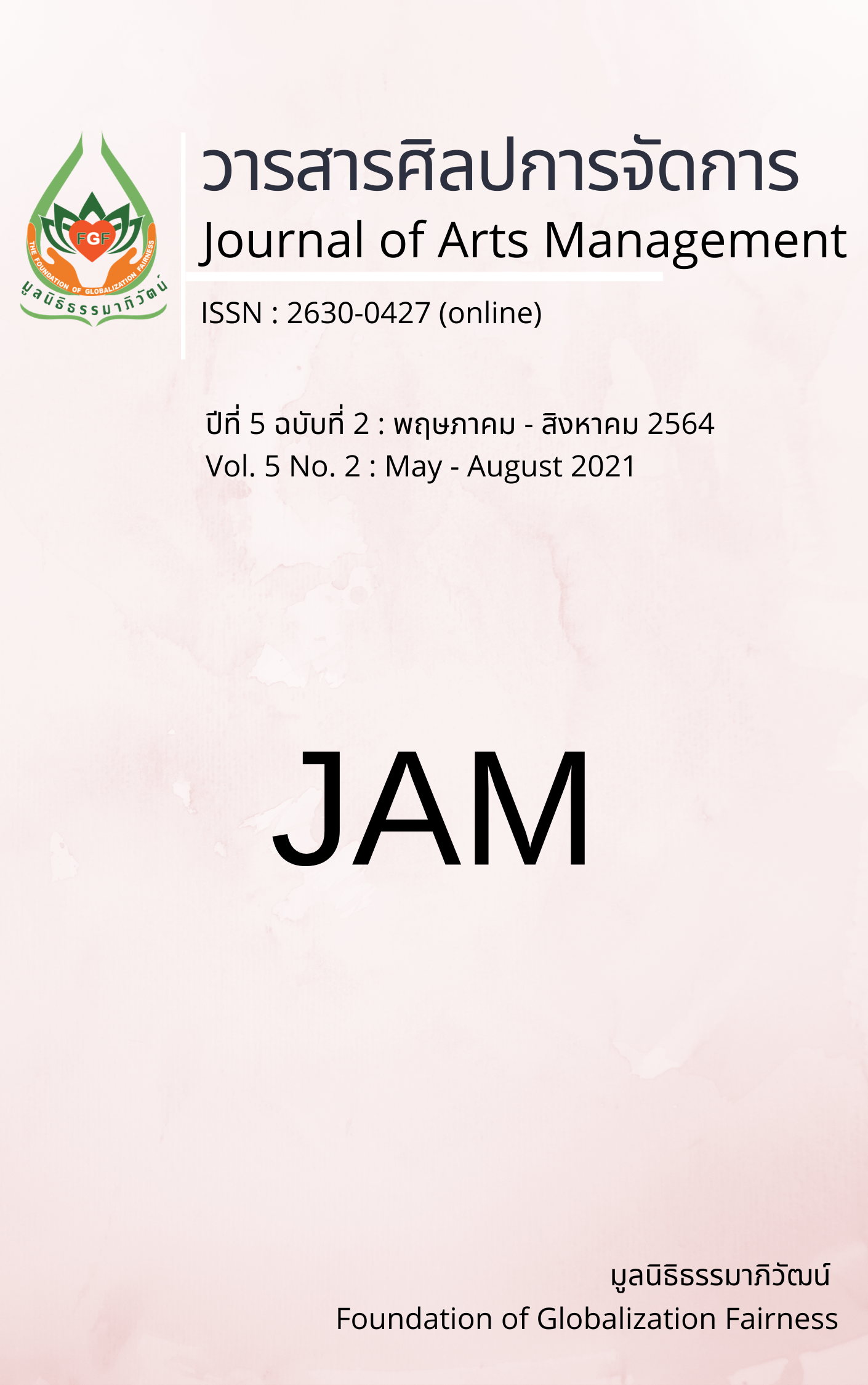Instructional Guideline to Enhance Citizens for Students Bachelor of College of Fine Arts, Bunditpatanasilpa Institute
Main Article Content
Abstract
The purposes of this study were (1) to study the citizenship composition of students; (2) to study teaching conditions at the College of Fine Arts context that strengthen students' citizenship; and (3) to propose teaching guidelines for students College of Fine Arts Bunditpatanasilpa Institute for citizenship. This study was a qualitative research. Collect information from documents primary data section conduct interviews with key informants from a specific selection. The instrument for collecting data was interview and group discussion. Organize information with theoretical references. Analyze content and summarize descriptive research results. Presenting teaching qualified to certify research results. The research results were found as follows:
1 Student citizenship component was respect: has the following meanings - understand the principles of democracy - accept different opinions - Self and social responsibility - Volunteer - Respect individual rights and - Respect the law.
2 Educational management in the context of the College of Fine Arts consists of learning from the problem, project-based teaching, creative exchange of knowledge, and the freedom of learning according to the habits.
3 The appropriate teaching and learning Guidelines were: CHANGSIL teaching method.
Research findings were teaching management CH-A-N-G-SIL GUIDELINES. That comes with Ch: Character education, A: Activate, N: Nature teaches the nature of the learners, G: Gimmick has a point to remember, and SIL: Silapa is diversified according to the students' style.
Article Details
Views and opinions appearing in articles in the Journal of Arts of Management It is the responsibility of the author of the article. and does not constitute the view and responsibility of the editorial team I agree that the article is copyright of the Arts and Management Journal.
References
กระทรวงศึกษาธิการ. (2545). พระราชบัญญัติการศึกษาแห่งชาติ พ.ศ. 2542 และที่แก้ไขเพิ่มเติม. สืบค้นเมื่อ 18 มิถุนายน 2563, จาก https://is.gd/Pm4Qpz
ชาย โพธิสิตา. (2559). ศาสตร์และศิลป์แห่งการวิจัยเชิงคุณภาพ. กรุงเทพฯ: อมรินทร์พริ้นติ้ง.
ซัม สาวพัตร์. (2561). พระบรมราโชวาทและพระราชดำรัส. กรุงเทพฯ: ย้อนรอย สนพ.
ถวิลวดี บุรีกุล และ คณะ (2555). ความเป็นพลเมืองในประเทศไทย (Citizenship in Thailand). กรุงเทพฯ: สถาบันพระปกเกล้า.
ทองหล่อ วงษ์อินทร์ และ ชูชีพ เบียดนอก. (2560) . หลักสูตรการศึกษาเพื่อสร้างความเป็นพลเมืองของไทย. วารสารวิชาการมหาวิทยาลัยปทุมธานี, 9(2), 295-299.
ทิศนา แขมมณี. (2551). ศาสตร์การสอน องค์ความรู้เพื่อการจัดกระบวนการเรียนรู้ที่มีประสิทธิภาพ. (พิมพ์ครั้งที่ 7). กรุงเทพฯ: สำนักพิมพ์แห่งจุฬาลงกรณ์มหาวิทยาลัย.
ปริญญา เทวานฤมิตรกุล. (2559). การศึกษาเพื่อสร้างพลเมือง (Civic Education). (พิมพ์ครั้งที่ 2). กรุงเทพฯ: มหาวิทยาลัยธรรมศาสตร์.
ปิ่นวดี ศรีสุพรรณ. (ม.ป.ป.). การวิจัยเชิงคุณภาพ และการวิจัยเชิงปฏิบัติการแบบมีส่วนร่วม เอกสารประกอบคำบรรยาย มหาวิทยาลัยอุบลราชธานี. สืบค้นเมื่อ 1 มีนาคม 2564, จาก https://www.ubu.ac.th/web/files_up/08f2017060214303218.pdf
ภณ ใจสมัคร. (2559). ความเป็นพลเมืองในสังคมยุคใหม่ เอกสารประกอบการสอนวิชาการดำรงชีวิตในสังคมยุคใหม่และประชาคมอาเซียน. สำนักวิชาศึกษาทั่วไป, มหาวิทยาลัยเกษมบัณฑิต.
วรากรณ์ สามโกเศศ. (2554, 3 มีนาคม). การศึกษาเพื่อสร้างความเป็นพลเมือง. มติชน.
ศราวุฒิ วิสาพรม และ คณะ. (2562). การวิเคราะห์การสร้างพลเมืองเพื่อเสริมสร้างประชาธิปไตยจากฐานราก: กรณีศึกษาโรงเรียนในสังกัดเทศบาลเมืองมหาสารคาม. วารสารการเมืองการปกครอง, 9(3), 1-23.
สมชาย วรกิจเกษมสกุล. (2554). ระเบียบวิธีการวิจัยทางพฤติกรรมศาสตร์และสังคมศาสตร์. อุดรธานี: อักษรศิลป์อุดรธานีการพิมพ์.
สุภีร์ สมอนา. (2558). ความเป็นพลเมืองของนักเรียนในโครงการโรงเรียนพลเมือง สถาบันพระปกเกล้า(รายงานวิจัย). สำนักส่งเสริมการเมืองภาคพลเมือง, สถาบันพระปกเกล้า.
สำนักงานราชบัณฑิตยสภา. (2554). พจนานุกรม ฉบับราชบัณฑิตยสถาน พ.ศ. 2554. สืบค้นเมื่อ 19 มิถุนายน 2563, จาก http://www.royin.go.th/dictionary/
เอนก เหล่าธรรมทัศน์. (2540). ส่วนรวมที่มิใช่รัฐ: ความหมายของประชาสังคม. กรุงเทพฯ: สำนักงานกองทุนสนับสนุนการวิจัย.
Anderson, T. P. (1997). Using Models of Instruction. In Drill, C. R., & Romiszowski, A. J., (Eds.). Instructional Development Paradigms. pp. 521-536. New Jersey: Educational Publications.
Joyce, B. R., & Weil, M. (2011). Model of Teaching. (8th ed.). USA: Allyn and Bacon.


